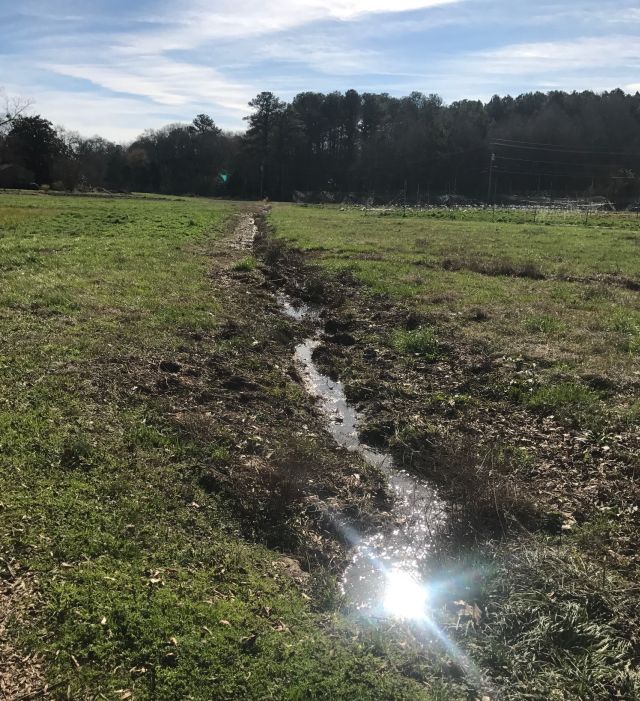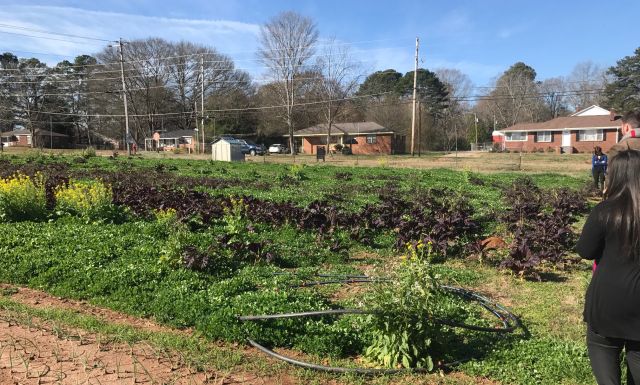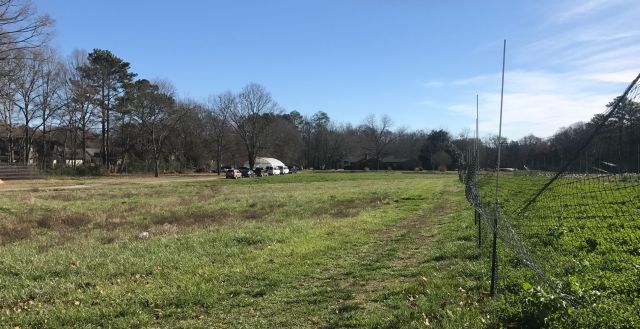Past Friday and Saturday I was at the GO conference. Friday morning we visited a farm (Emory Oxford College organic farm) about 20 miles east of Atlanta. The farm has CSA’s and provides food for the campus. The 2 managers were friendly and experienced and we also listened to the narratives of college interns and volunteers. There is an impressive barn building on concrete pad where the harvest is cleaned and refrigerated and tractors and equipment serviced.

I learned a little about commercial organic growing – there is no room for error. A bug in lettuce can lose a customer or a restaurant contract. Therefore the aphid infestation in the lovely lettuce in the hoop house meant just one thing – into the compost heap. I would have washed and enjoyed. As to why the lettuce was infested – the problem wasn’t identified early enough and in warm humid conditions too much nitrogen produces rapid growth and a buffet for insects.

That afternoon I attended an excellent workshop on Cool Season Vegetables under High Tunnels. High tunnels are popular with commercial organic growers and one speaker, whose farm I visited several years ago, now has 28 structures. Increasing temperatures mean less growing in the hottest months, but the high tunnel extends the season to enable more growing in the other 3 seasons. Because the crops are not exposed to rain and receive just enough water for their needs there is little leaching which means that too much nitrogen rather than too little, becomes the problem – hence the lettuce infestation. Constant observation and timely management is essential as is adequate ventilation and shade cloth in the summer. Most growing is with transplants. Automated irrigation is used extensively including fertigation where water soluble fertilizers and amendments are passed through the irrigation system. Solarization with clear plastic, to burn up weed seeds and diseases is often performed followed first with carrots, which take a long time to germinate. And lots of soil fertility tests or plant tissue tests. And cover crops when there is a 1-2 month window, which is infrequent. I do not think I will need a high tunnel for my limited growing needs, especially with milder winters – my turnips and some other greens to date have been unscathed by winter.
A good lecture on the World of Organic Inputs. Again, need for soil tests stressed. I was surprised how much the commercial growers buy inputs and even compost. I try to be self sufficient and rarely buy any inputs for growing – seed starter mix, peat for the pot soil, and sulfur for the blue berries excepted. However professional farmers focus on growing and depend on other specialists for their inputs. My growing operation revolves around my compost but most professionals buy their compost. Apparently a concern that bad compost can jeopardize their organic certification. Bad such as prohibited drugs in animal manure or cides in grasses used to make compost, or compost not reaching high enough temperatures and therefore carry over problems. We were told phosphorous would probably be ok but to focus on potassium (for disease resistance and stress) which is mobile and prone to leaching, and also on calcium (for cell walls and root tips). We should avoid dolomitic lime because it provides magnesium and we may already have too much magnesium. Soil tests!
Next was Farm Generated Innovations. The 2 speakers described some of their innovations which were imaginative and resourceful. And they referenced a website farmhack.org which describes itself as “a community of collaborators interested in developing and sharing open-source tools for a resilient agriculture”. Well worth visiting.
Then a lecture on trellising – why we do it and different materials and strategies. And then a sobering lecture on mistakes and challenges.
Followed Saturday evening with the Farmers Feast prepared by top Atlanta chefs and an attention grabbing lyrical overview of the life of the farmer by the guest speaker, BB Taylor. You can tell an address is good when, without prompting the >1,000 attendees without hushing gradually stop talking among themselves and tune in to the words. Overall, a most enjoyable 2 day event.

